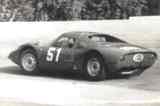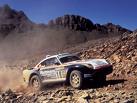

| site search byfreefind | |||
|
|||
Before Porsche’s 959 supercar was announced for production at the 1985 International Motor Show in Frankfurt, Germany, it had already been tested in the harshest motorsport event on the planet – the Dakar Rally. On October 27, a Dakar-raced Porsche 959 – one of three built to compete in the 1985 event – will cross the auction stage in Atlanta, Georgia, part of RM Sotheby’s Porsche 70th Anniversary Sale.
1985 Porsche 959 Paris-Dakar
Technically speaking, chassis 010015 – the desert-raced Porsche to be offered in Atlanta – is a 959 hybrid. It’s powered by a normally aspirated, 3.2-liter, 230-horsepower flat-six engine borrowed from a production Porsche Carrera, instead of the 2.8-liter, twin sequential turbocharger, 444-horsepower flat-six found in production 959 models. It does use the 959’s aerodynamic body and four-wheel drive system, however, and proved to be an important link in the model’s chain of evolution.
1985 Porsche 959 Paris-Dakar
Porsche’s first attempt to run the Dakar Rally came in 1984, after 1983 winner Jacky Ickx approached the German automaker with the idea of entering a 911 in the annual test of endurance and durability. Ickx brought African desert racing experience to the table, along with sponsorship money from Rothmans International, which would help fund the development of Porsche’s “super 911,” then referred to as the Group B Study. For the 1984 Dakar Rally, Porsche prepared a trio of cars it designated Type 953, which were essentially 911s modified with a manually-controlled four-wheel drive system and long-travel suspensions. Power for the 953, which was also referred to as the 911 4×4, came from the 3.2-liter Carrera flat six, running a slightly lower compression ratio to cope with the varying quality of gasoline available throughout Northern Africa.
1985 Porsche 959 Paris-Dakar
All three Porsche 953s entered in the 1984 Dakar Rally finished the race, with the car driven by Rene Metge (with co-driver Dominique Lemoyne) taking the overall win. A second team car, driven by Ickx and co-driver Claude Brasseur, finished sixth, while the final entry (piloted by Roland Kussmaul and Erich Lerner) finished in 26th place overall. Even this was not a disappointing result, since the third car’s primary function was as a service car for the Porsche team.
1985 Porsche 959 Paris-Dakar
For the 1985 Dakar Rally, Porsche stepped up its game, preparing three cars clad in the 959’s Kevlar bodywork and equipped with the car’s variable torque management all-wheel drive system, capable of sending up to 80-percent of the engine’s output to the rear wheels to enhance grip. To ensure reliability, the 3.2-liter Carrera engine was again chosen, despite its modest 230-horsepower output in detuned form. Metge and Lemoyne would drive chassis 010015, while the other team cars would be piloted by Ickx and Brasseur, and Jochen Mass, with co-driver Ekkehard Kiefer.
1985 Porsche 959 Paris-Dakar
For Porsche, 1985 would be a learning year, with little of the previous year’s glory. The 959s of Ickx/Brasseur and Mass/Kiefer retired early, both succumbing to accidents, while the team car of Metge/Lemoyne dropped out in stage nine, the victim of an oil leak. Bad luck aside, the cars ran well, with Icxk collecting a single stage win and Metge earning two before 010015’s retirement. As a rolling laboratory for the development of the 959, the 1985 cars proved to be a great success.
1985 Porsche 959 Paris-Dakar
In January 1986, Porsche returned to the Dakar Rally with a trio of new, competition-prepared 959s, this time featuring the 2.8-liter, twin-sequential turbo that would later appear in production models, de-tuned with a lowered compression ratio to 400 horsepower. At the end of 15,000 kilometers (9,300 miles) and 18 stages, Porsche 959s finished first (Metge/Lemoyne), second (Ickx/Brasseur), and sixth (Kussmaul/ Hendrick Unger, driving the team’s service car), solidifying the model’s legendary reputation before the first production 959 was even delivered. With nothing left to prove and the model now fully developed, Porsche ceased its Dakar Rally efforts after the 1986 event.
1985 Porsche 959 Paris-Dakar
Just six Porsche 959 models were ever built for Dakar competition, including three with normally aspirated 3.2-liter engines (including chassis 010015) and three with twin-sequentially turbocharged 2.8-liter engines. Of these, five are known to survive today, with no more than three in the possession of private collectors, making this a particularly appealing artifact for collectors of Porsche racing cars.
1985 Porsche 959 Paris-Dakar
Previously owned by Jacky Ickx, chassis 010015 has been exhibited at the Goodwood Festival of Speed (from 2004-’06), at the Royal Automobile Club in London, and at The Quail: A Motorsports Gathering, where it earned a Best in Class Award at the 2008 fête. Described as the first Dakar 959 ever offered at a public auction, RM Sotheby’s predicts a selling price between $3.0 million and $3.4 million when the car crosses the block in Atlanta this October.




